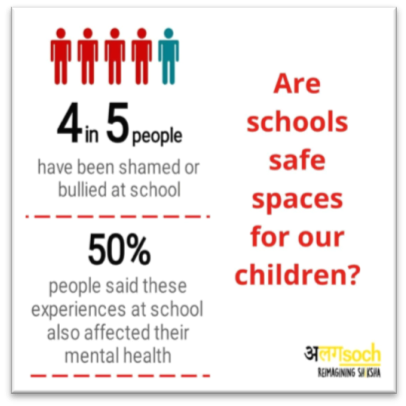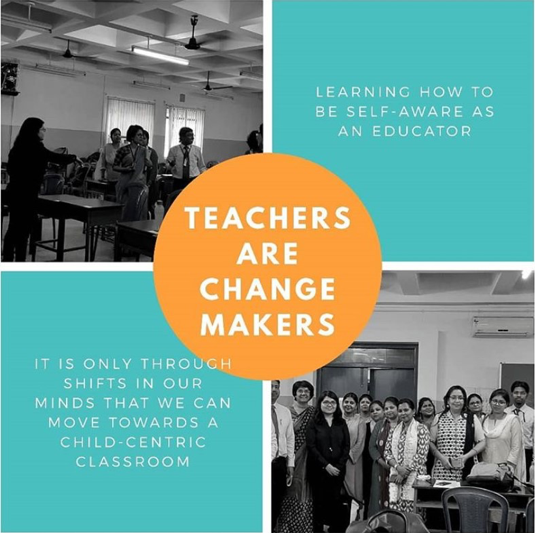Teachers are the change-makers of our education system; an education system which was developed during the industrial revolution where employability skills meant following orders, to stand up, sit down, rote-learn and fall in line. The 21st century demands critical thinking, problem-solving skills, communication, collaboration etc. as basic employability skills. However, our school systems are not transforming with the change in times. This leads to students not cultivating skills which they require in their personal/professional lives. This further complicates their existence and leads to issues pertaining to mental health. In a survey conducted by Alag Soch with 350 respondents across West Bengal, 55% of them said that they suffered from mental health issues which can be traced back to their experiences indue school; this roughly translates into 1 in every 2 students.

In such circumstances, teachers are who we need to depend on for transforming school systems. Teachers need to foster social-emotional learning (SEL) sessions and activities in schools and within classrooms. A transformation of their own teaching and learning practices with enhance both the academic credibility the well-being of the students. Teachers who create warm and positive relationship with children in the classrooms support sound learning and social-emotional development among children. It is a skill especially required within a classroom comprising of students across varied socio-political backgrounds and experiences. When it comes to teaching in classrooms or learning about life in general, SEL is the best tool available for teachers to understand their own selves better and obtain helpful and progressive perspectives.
Teachers need SEL sessions because it equips them with the skills necessary to navigate their everyday life in general and life within the school classroom, allowing them to make decisions based on empathy and regard for others. SEL helps them grow to be a role model for students to learn ways to express emotions and feelings. It is the most valuable drive that emphasizes more on "soft skills" such as behavior, self-control, empathy, decisiveness, co-operation and interpersonal development.

SEL is as important for teachers as it is for students. Research shows that SEL practices help students and teachers form and sustain better quality relationships, and improve both students’ and teachers’ psychological health. It contributes to the teachers’ own feelings of contentment and helps them be more organized and responsive to students’ needs. SEL can be taught and measured too in terms of teachers’ performance and behaviors.
Alag Soch did a series of social-emotional development sessions with around 40 teachers over a period of four months. Two months into these sessions, 73% of teachers said that they looked forward to the next sessions because they felt more motivated to do their work; they were able to handle conflicts better and felt less drained out in their work life. They also expressed that they were able to communicate better and have better relationships in both their personal and professional lives. This led to a better work atmosphere, better relationships with children and more inclusive classrooms which translated into development in academic outcomes in students.
According to Patricia Jennings and Mark Greenberg, leading scientists in the field of social-emotional learning, teachers who possess social-emotional competencies (SEC) are less likely to experience burnout because they’re able to work more effectively with challenging students—one of the main causes of burnout. Teachers who are stressed-out more often create hostile work conditions, have low self-esteem, and display a lack of planning. Stressed-out teachers struggle compared to those marked by quality relationships, positive psychological health and well being.
What constrains educators from experiencing the very real benefits of SEL is a lack of training; teachers feel poorly prepared to tackle problems because they lack knowledge and skills in terms of mental health or classroom management. By developing social-emotional skills, teachers can rediscover the art of teaching positively, having a sense of self-awareness and social-awareness. SEL is most productive when all teachers are invested in learning the skill.
With SEL, teachers not only experience less anxiety but they also build greater self-efficacy, better relationships with students and can be supportive to colleagues and family. They are able deal with conflicts more effectively, set positive goals that make them happier and more attentive. When teachers are allowed to practice SEL beyond the theoretical to the practical life, it enables them to expeditiously and efficaciously appreciate and evaluate students’ involvement and development.